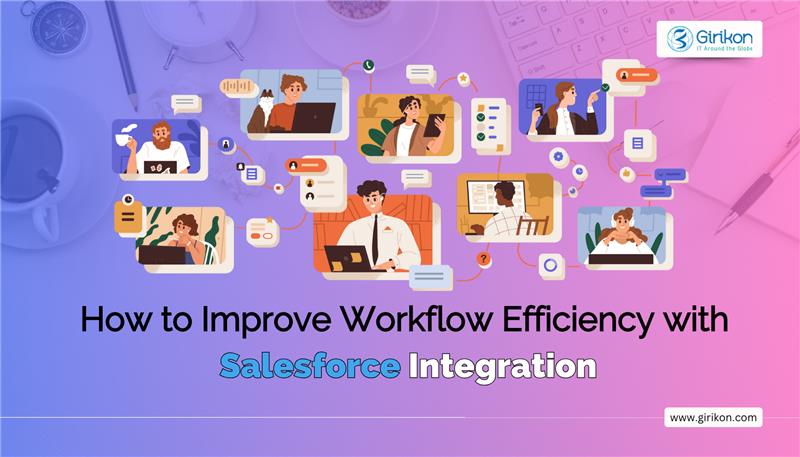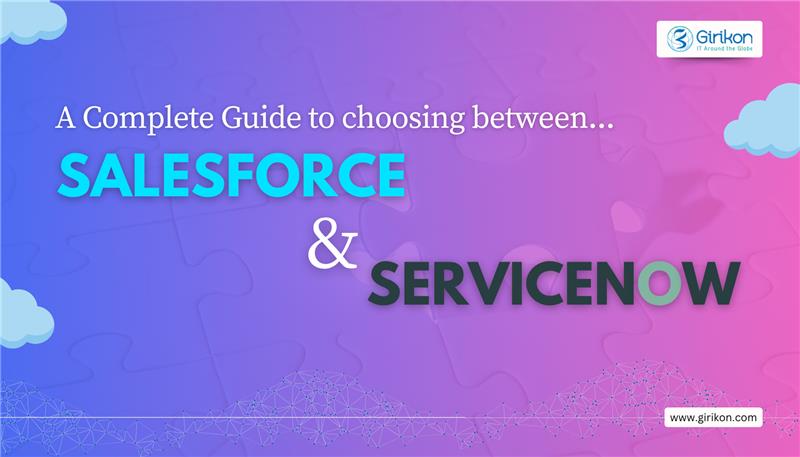Our Blogs
There is no room for inefficient and fragmented processes in today’s fast-paced business landscape. Time wasted on manual entry of data, disconnected systems, disjointed processes and fragmented communication system translates to low productivity and missed opportunity. While most businesses are leveraging cloud-based CRM systems like Salesforce for managing their processes and ensuring operational efficiency, yet Salesforce alone fails to manage the overall activities of a business. Organizations are therefore turning to Salesforce integration services – a strategy that brings all other systems under one umbrella.

Integrating Salesforce with other systems can augment workflow efficiency, automate repetitive tasks, and provide real-time visibility across your entire organization. This article explores key areas to focus on integrating Salesforce with other systems.
All About Salesforce Integration Services
It involves integrating Salesforce with different systems, apps or databases. This enables data to move seamlessly between them without the need to shift between platforms. Depending on your business needs and technical capabilities, there are various ways of connecting Salesforce with other Apps. One method involves using AppExchange apps, including pre-built tools available on Salesforce’s marketplace. These apps can be directly integrated into your Salesforce environment, offering easy integration with setup. For more tailor-made solutions, developers can use APIs.
Using middleware platform is another option, which act as bridge between various applications, allowing data to move between cloud-based and on-premise systems without any manual effort. Ultimately, native connectors offer in-built integration for tools used commonly. Besides simplify data sharing, these connectors streamline workflows between Salesforce and other platforms, already used by your team.
Significant Advantages of Salesforce Integration for Workflow Efficiency
Automate Repetitive Tasks: Every business must follow some routine tasks that consume valuable time. By integrating Salesforce with other systems, these repetitive activities can be easily automated. Rather than doing them manually, you can set up workflows that get automatically triggered within Salesforce. This not just saves precious time but also allows them to focus on strategic tasks.
Increasing Precision: Manual processes often lead to costly mistakes. To fix these errors, a lot of time and money will be consumed. Integrating your systems with Salesforce minimizes these risks by automating tasks and ensuring these tasks are performed consistently. This will not just ensure precision and efficiency but also builds trust with your customers by delivering desired outcome.
Accelerate Response Times: Customers today lack patience and expect prompt response. By integrating Salesforce with their existing systems, organizations can automate their processes, which can accelerate time taken by reps to provide instant resolution to their queries. To understand this better, let’s take the example of a customer whose support ticket on being submitted is instantly routed to the concerned staff for quick resolution. This level of automation assists you in offering better service while ensuring heightened customer satisfaction.
Enhanced Team Collaboration: To ensure efficient work processes, different departments of an organizations should function in coordination with each other. Salesforce integration steps in as a blessing in disguise as it connects different departments while ensuring seamless communication within the team. For example, sales and service teams can view the status of a project if you have connected your project management App with Salesforce. If any sort of changes is required to be made, then people can be intimidated to accomplish that task within the same deadline. This will ensure everyone is in harmony and doing what is right.
Scalability: As organizations grow, they would either require scaling up or scaling down operations. Traditional methods couldn't match up with the expansion, creating bottlenecks that hinder growth. Integration solutions help deal with these challenges by enabling scalable workflows that could adapt as your business evolves.
Drawing Intelligent Insights: Drawing Intelligent Insights: Automation not only saves time—it also equips users with valuable data to make more informed business decisions. By integrating systems with Salesforce, you can track the performance of your most-used workflows across platforms. Processes that are automated can generate documents and reports that reveal key trends that enable you to figure out what’s working well and whether there is room for improvement.
The Road Ahead for Salesforce Integration
Salesforce integration is poised for continuous evolution and is driven primarily by cloud-first approaches. The emergence of new technologies ensures a bright future for this integration.
Cloud-Based Solutions: Besides the scalability and adaptability required to link systems across different environments, these platforms accelerate the shift toward deeper digital transformation.
AI-Driven Automation: AI eases the integration process by automating the process of data processing and other operations. This paves the way for creating predictive models that enable companies to make pre-emptive decisions to provide customers with an optimum experience.
How to Avail Best Salesforce Integration Services?
To leverage Salesforce Integrations to its maximum potential, businesses must opt for Salesforce Consulting Services. Here are few tips that will ensure you associate with the right consultant:
Seek Services from a Cloud-Based Integration Expert: Make sure to avail Salesforce Consulting services from a reliable provider with proven experience in cloud-based solutions. Such experts can easily integrate Salesforce with various cloud applications while helping boost flexibility and scalability.
Verify their Credentials: The consulting partner you shortlist should possess relevant Salesforce certifications. Certifications not just indicate experience, as well as their zeal to keep up with the new features of Salesforce.
Seek Client Feedback: Testimonials and feedbacks highlight the consultant’s ability to deliver successful results. Effective integration projects should showcase expertise in lowering IT expenses and optimizing operational efficiency.
Assess Customization Expertise: Make sure to select a consultant who is capable of tailoring Salesforce solutions to meet the unique needs of your business. Tailor-made integrations augment the efficiency, as well as the performance of your IT operations.
Final Words:
Businesses looking for sustainable growth should consider implementing Salesforce with their existing system. It is indeed a strategic investment; which organizations can make for their long-term growth. Salesforce integration enables teams to automate workflows, minimize incompetency and boost overall productivity. Make sure to associate with an experienced Salesforce implementation partner to avail reliable integration services.

 +1-480-382-1320
+1-480-382-1320 +44-7428758945
+44-7428758945 +61-1300-332-888
+61-1300-332-888 +91 9811400594
+91 9811400594


















